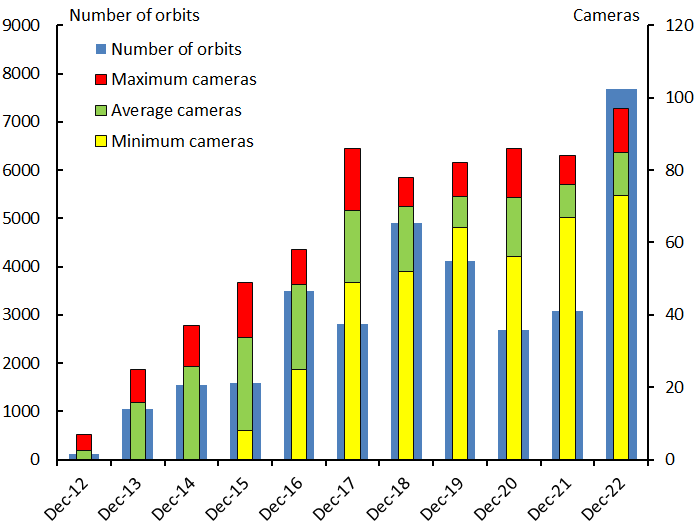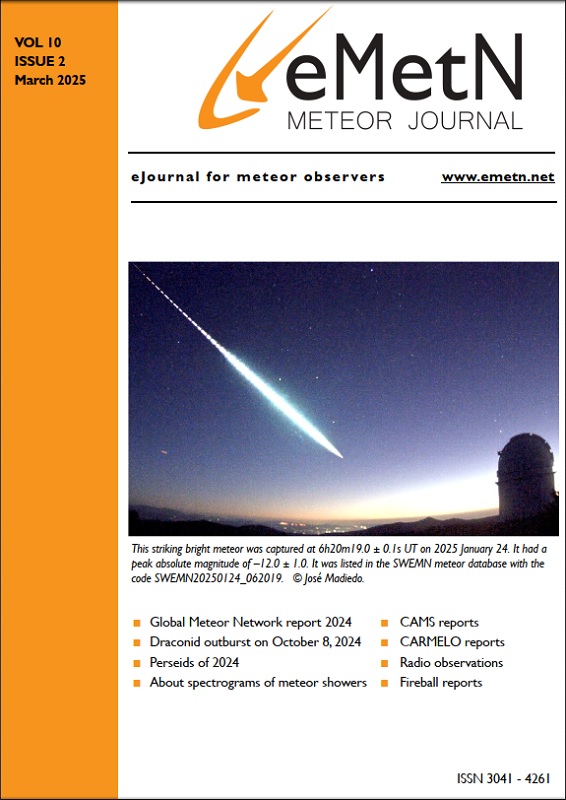By Carl Johannink
Abstract: A summary of the activity of the CAMS BeNeLux network during the month of December 2022 is presented. This month we collected a total of 26326 multi-station meteors resulting in 7680 orbits.
Introduction
Only under specific favorable circumstances the BeNeLux region can count on a longer series of clear nights in December. Meteor activity is very high this month, due to high sporadic activity and the visibility of meteoroid streams like the Geminids and the Ursids. Especially during clear nights during the Geminid maximum, this shower can produce large numbers of simultaneous meteors in our network. But chances for clear weather in this time of the year are rather low. However, it is interesting to see what this month have brought us.
December 2022 statistics
December started with gloomy conditions, as can be expected for our regions. Only 130 orbits could be collected during the first week, despite at least 74 cameras were active every night during this period.
But then the weather above western Europe evolved to a more winterly pattern, with clear skies most of the time around the Geminid maximum at December 13–14. Hence, it is no surprise that we could collect a large number of orbits then.
On December 14–15, 1743 orbits, and on December 12–13, 1946 orbits were recorded. The last number is an all-time record in the history of our network. During the maximum night, observations in the more southern parts of the BeNeLux were hampered by clouds. Despite the maximum activity of the Geminids, this night resulted in a drop-off to about ~700 orbits.
After this remarkable period, weather picked up the normal pattern, with more or less only clear spells during the nights. Only December 26–27 and 29–30 were completely clear nights. As a result, we could collect around 500 orbits during both nights.
On December 2–3, 4–5, 18–19 and 30–31 the skies remained completely cloudy over all of the BeNeLux. This month CAMS BeNeLux collected a total of 26326 multi station meteors, resulting in 7680 orbits. 58% of all orbits were collected by at least 3 stations. Once again, like in October and November, this emphasizes good coverage of the skies over the BeNeLux. The network has been still expanding its number of cameras and participants.

Figure 1 – Comparing December 2022 to previous months of December in the CAMS BeNeLux history. The blue bars represent the number of orbits, the red bars the maximum number of cameras capturing in a single night, the green bar the average number of cameras capturing per night and the yellow bar the minimum number.
Table 1 – Number of orbits and active cameras in the BeNeLux during December 2012–2022.
| Year | Nights | Orbits | Stations | Max. Cams | Min. Cams | Mean Cams |
| 2012 | 12 | 117 | 6 | 7 | – | 2.4 |
| 2013 | 23 | 1053 | 10 | 25 | – | 15.7 |
| 2014 | 19 | 1540 | 14 | 37 | – | 25.8 |
| 2015 | 27 | 1589 | 15 | 49 | 8 | 33.8 |
| 2016 | 25 | 3492 | 21 | 58 | 25 | 48.3 |
| 2017 | 25 | 2804 | 22 | 86 | 49 | 68.9 |
| 2018 | 23 | 4908 | 21 | 78 | 52 | 69.8 |
| 2019 | 28 | 4124 | 21 | 82 | 64 | 72.8 |
| 2020 | 24 | 2693 | 24 | 86 | 56 | 72.4 |
| 2021 | 25 | 3072 | 25 | 84 | 67 | 76.0 |
| 2022 | 27 | 7680 | 31 | 97 | 73 | 84.8 |
| Total | 258 | 33072 |
Steve Rau installed a new RMS camera (3840) at the Observatory “Armand Pien” in Gent. This camera will be operated by Tim Polfliet as soon as everything works smoothly. In Luxemburg we could welcome a new station at the capital of this country. Jan Thoemel operates CAMS 3950 since December 13 and in the future CAMS 3951 will become operational.
At Winterswijk Woold Hans Betlem and the author added 5 WATECS to this station. A first step to increase the numbers of orbits from this part of the BeNeLux.
The mean number of active cameras this month was 84.8. At 31 stations at least 73 cameras were active every night this month. The highest number of active cameras was 97 on December 29–30.
These numbers can be compared with last month. See Figure 1 and Table 1.
Conclusion
The results for December 2022 are the best in the 11 years of the existence of the CAMS BeNeLux network.
Acknowledgment
Many thanks to all operators in the CAMS BeNeLux network for their work and quick delivery of data. In December 2022 the CAMS BeNeLux network was operated by the following volunteers:
Hans Betlem (Woold, Netherlands, CAMS 3071, 3072, 3073, 3074, 3075, 3076, 3077 and 3078), Jean-Marie Biets (Wilderen, Belgium, CAMS 379, 380, 381 and 382), Ludger Boergerding (Holdorf, Germany, RMS 3801), Günther Boerjan (Assenede, Belgium, RMS 3823), Martin Breukers (Hengelo, Netherlands, CAMS 320, 321, 322, 323, 324, 325, 326 and 327, RMS 319, 328 and 329), Seppe Canonaco (Genk, RMS 3818 and 3819), Pierre de Ponthiere (Lesve, Belgium, RMS 3816 and 3826), Bart Dessoy (Zoersel, Belgium, CAMS 804, 805 and 806), Tammo Jan Dijkema (Dwingeloo, Netherlands, RMS 3199), Isabelle Ansseau, Jean-Paul Dumoulin, Dominique Guiot and Christian Walin (Grapfontaine, Belgium, CAMS 814 and 815, RMS 3814 and 3817), Uwe Glässner (Langenfeld, Germany, RMS 3800), Luc Gobin (Mechelen, Belgium, CAMS 3890, 3891, 3892 and 3893), Tioga Gulon (Nancy, France, CAMS 3900 and 3901), Robert Haas (Alphen aan de Rijn, Netherlands, CAMS 3160, 3161, 3162, 3163, 3164, 3165, 3166 and 3167), Robert Haas (Texel, Netherlands, CAMS 811), Kees Habraken (Kattendijke, Netherlands, RMS 3780 and 3781), Klaas Jobse (Oostkapelle, Netherlands, CAMS 3030, 3031, 3032, 3033, 3034, 3035, 3036 and 3037), Carl Johannink (Gronau, Germany, CAMS 3100, 3101, 3102), Reinhard Kühn (Flatzby, Germany, RMS 3802), Hervé Lamy (Dourbes, Belgium, CAMS 395, RMS 3825), Hervé Lamy (Humain, Belgium, RMS 3821 and 3828), Hervé Lamy (Ukkel, Belgium, CAMS 393), Koen Miskotte (Ermelo, Netherlands, CAMS 3051, 353 and 354), Pierre-Yves Péchart (Hagnicourt, France, RMS 3902 and 3903), Tim Polfliet (Gent, Belgium, CAMS 396, RMS 3820 and 3840), Steve Rau (Zillebeke, Belgium, CAMS 3850 and 3852, RMS 3851 and 3853), Paul and Adriana Roggemans (Mechelen, Belgium, RMS 3830 and 3831, CAMS 3832, 3833, 3834, 3835, 3836 and 3837), Jim Rowe (Eastbourne, Great Britain, RMS 3829), Philippe Schaack (Roodt-sur-Syre, Luxemburg, RMS 3952), Hans Schremmer (Niederkruechten, Germany, CAMS 803), Jan Thoemel (Luxemburg, Luxemburg, CAMS 3950), Erwin van Ballegoij (Heesh, Netherlands CAMS 3148 and 3149).

